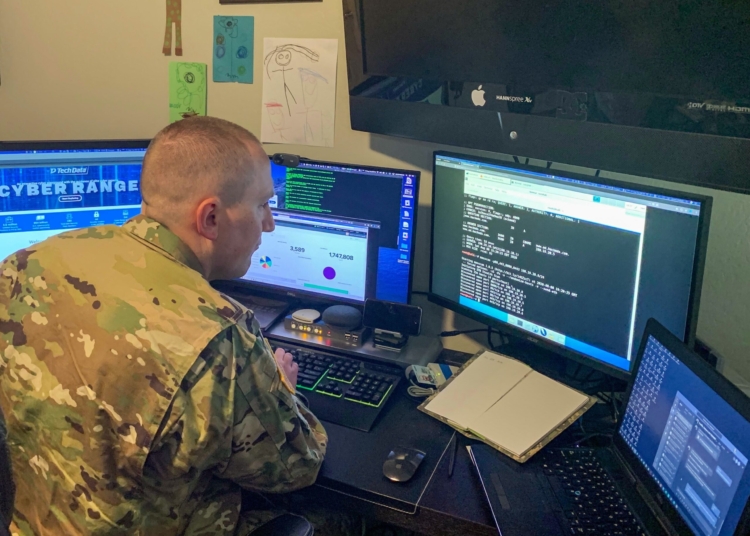This article explores the role of cybersecurity in modern warfare. As technology advances, cybersecurity has become essential in protecting military infrastructure, communications, and operations from cyber threats. State-sponsored hackers, cybercriminal groups, and hacktivists now target military targets, posing severe consequences if successful. Two primary objectives of cyber warfare are to disrupt command and control systems and exploit vulnerabilities in weapon systems. Military organizations worldwide recognize the importance of cybersecurity in modern warfare. It plays a role in protecting communication infrastructure, building resilient defense systems, training cyber warriors, collaborating with civilian expertise, and establishing international norms. Emphasizing cybersecurity, investing in defensive capabilities, and promoting international collaboration are crucial steps forward in securing the battlefield.
Securing the Battlefield: Exploring the Role of Cybersecurity in Warfare
Introduction
In today’s technology-driven world, cybersecurity has become a crucial aspect of modern warfare. As nations continue to develop and rely on advanced technological systems, the battlefield has extended into cyberspace. Cybersecurity plays a vital role in protecting military infrastructure, communications, and operations from potential adversaries seeking to exploit vulnerabilities. This article aims to delve into the multifaceted role of cybersecurity in warfare and its impact on modern military operations.
The Growing Threat Landscape
Cyber threats are no longer confined to financial institutions and corporate networks. State-sponsored hackers, organized cybercriminal groups, and hacktivists have increasingly turned their attention to military targets. The potential consequences of a successful cyber-attack on military infrastructure are severe, including disrupting defense systems, compromising sensitive data, and even compromising the safety and lives of military personnel.
1. Targeting Command and Control Systems
One of the primary objectives of cyber warfare is to disrupt command and control systems. By targeting these critical systems, adversaries aim to undermine a military’s ability to effectively coordinate and respond to threats. The compromise of command and control systems can lead to confusion, delays in response time, and potentially catastrophic consequences on the battlefield.
2. Weapon Systems Vulnerabilities
Modern military operations heavily rely on sophisticated weapon systems, such as drones, missiles, and autonomous vehicles. These systems are often interconnected with networks, making them vulnerable to cyber-attacks. Adversaries seek to exploit these vulnerabilities to gain unauthorized control or disrupt the functionality of these weapon systems, rendering them useless or potentially turning them against their operators.
The Role of Cybersecurity in Modern Warfare
In response to the growing threat landscape, military organizations worldwide have recognized the critical importance of cybersecurity in modern warfare. The role of cybersecurity in securing the battlefield encompasses several key areas:
1. Protecting Communication Infrastructure
Effective communication is fundamental to successful military operations. Cybersecurity ensures the integrity, confidentiality, and availability of communication channels. Encryption and advanced authentication mechanisms safeguard military communication from interception, manipulation, and unauthorized access, thereby preserving the integrity of critical information.
2. Building Resilient Defense Systems
Cybersecurity is vital in ensuring the resiliency of military defense systems. This involves employing robust cybersecurity measures to identify and mitigate vulnerabilities in systems, networks, and software. Proactive monitoring, threat intelligence, and regular security audits help maintain readiness against cyber threats and allow military organizations to respond swiftly and effectively to potential attacks.
3. Training Cyber Warriors
Military organizations invest significant resources in training cyber warriors, skilled personnel well-versed in offensive and defensive cyber operations. These professionals are responsible for identifying and neutralizing cyber threats, conducting cyber-espionage missions, and maintaining the cybersecurity infrastructure within military organizations.
4. Collaborating with Civilian Expertise
Given the complexity and ever-evolving nature of cyber threats, collaboration with civilian cybersecurity experts and private industry is essential. Military organizations often collaborate with technology firms and academia to access cutting-edge technologies, expertise, and fresh perspectives on emerging cyber threats. Public-private partnerships enable military organizations to leverage the collective knowledge and resources available outside their traditional structure.
5. Establishing International Norms
In an effort to mitigate the risk of escalating cyber conflicts, nations are actively working to establish international norms and rules of engagement in cyberspace. These norms aim to define the boundaries of acceptable behavior in cyberspace, discourage malicious activities, and facilitate cooperation in deterring and responding to cyber threats. Cybersecurity plays a pivotal role in shaping these international norms and ensuring their effective implementation.
The Way Forward
As technology continues to advance, modern warfare will become increasingly reliant on cyberspace. The role of cybersecurity will only grow in significance to protect military infrastructure, critical communication systems, and ultimately the safety and effectiveness of military personnel. Emphasizing the importance of cybersecurity in military doctrines, investing in advanced defensive capabilities, and promoting international collaboration are crucial steps forward in securing the battlefield in this new era of warfare.













